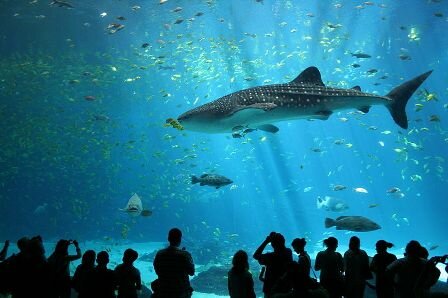These following facts about whale sharks will probably help you to know more about this fish species. You sometimes heard that shark often attack human. Is that the same with the whale shark? Then reading these facts should probably help you to know about it more. Whale shark is a slow-moving filter feeding shark and the largest known extant fish species. the largest confirmed individual had a length of 12.65 meters and a weight of more than 21.5 metric tons, and there are unconfirmed reports of considerably larger whale sharks. To get to know more about this animal, here are some other facts about whale sharks you may consider interesting.
Facts about whale sharks 1: Habitat
In 2011 the largest aggregation of whale sharks ever recorded was reported from the Yucatan coast of Mexico, in which more than 400 animals gathered in one place to feed on spawn from the little tunny.
Facts about whale sharks 2: Diet
The whale shark is a filter feeder, one of only three known filter feeding shark species. It feeds on macro-algae, plankton, krill, Christmas Island red crab larvae and small nektonic life such as small squid or vertebrates. It also feeds on small fish and the clouds of eggs and sperm during mass spawning of fish shoals.
Facts about whale sharks 3: Reproduction
Neither mating nor pupping of whale sharks has been observed. The capture of a female in July 1996 who was pregnant with 300 pups indicates that whale sharks are ovoviviparous. The eggs remain in the body and the females give birth to live young which are 40 to 60 centimeters (16 to 24 in) long.
Facts about whale sharks 4: Conservation Status
The whale shark is targeted by commercial fisheries in several areas where they seasonally aggregate. The population is unknown and the species is considered vulnerable by the IUCN.
Facts about whale sharks 5: Human Culture
In Mexico, and throughout much of Latin America, the whale shark is known as “pez dama” or “domino” for its distinctive patterns of spots. However, they go by “Sapodilla Tom” in Belize due to the regularity of sightings near the Sapodilla Cayes on the Belize Barrier Reef.
Facts about whale sharks 6: Behavior
Despite its size, the whale shark does not pose significant danger to humans. Although massive, whale sharks are docile fish and sometimes allow swimmers to catch a ride, although this practice is discouraged by shark scientists and conservationists.
Facts about whale sharks 7: In Captivity
Two whale sharks were featured as the main attraction of Osaka Aquarium Kaiyukun and as of 2005, three whale sharks are in captivity at the Okinawa Churaumi Aquarium in Japan. The Ioworld Aquarium in Kagoshima, Japan, also features a single adult whale shark as a major attraction.
Facts about whale sharks 8: Active Feeder
The whale shark is an active feeder, targeting concentrations of plankton or fish. It is able to ram filter feed or can gulp in a stationary position. This is in contrast to the passive feeding basking shark, which does not pump water. Instead, it swims to force water across its gills.
Facts about whale sharks 9: Economic Impacts
In tropical regions where these animals congregate in predictable, seasonal patterns, they are an important cornerstone of local ecotourism efforts. In Thailand, Belize, Utila, and the Yucatan Peninsula (Isla Holbox and Isla Mujeres), numerous scuba diving and snorkeling tour operators depend on whale sharks for their livelihood.
Facts about whale sharks 10: Life Span
The whale shark is found in tropical and warm oceans and lives in the open sea with a lifespan of about 70 years. Although whale sharks have very large mouths, as filter feeders they feed mainly, though not exclusively, on plankton, which are microscopic plants and animals.
Hope you found these whale sharks facts really interesting and useful for your knowledge and research.










 www.PortlandPayday.Loans
www.PortlandPayday.Loans